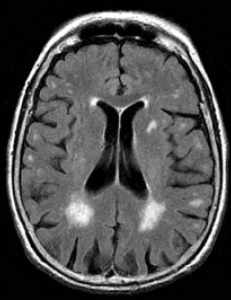

MedFriendly®


Ischemia
Ischemia is a decrease in the amount of oxygen-containing
blood to a specific organ, tissue, or body part. Conditions that
clog, narrow, or injure blood vessels can cause ischemia.
Usually, problems with the arteries (blood vessels carrying
blood away from the heart) cause ischemia, but problems with
the veins (blood vessels that carry blood to the heart) can also
lead to ischemia. If the heart pumps blood poorly, this can also
cause ischemia and result in not enough blood reaching a
specific body part(s). An ischemic stroke is when blood flow to
part of the brain stops due to decreased oxygen resulting from
an obstruction. This causes the majority of stroke cases and
differs from a hemorrhagic stroke which is when blood flow to
the brain in affected due to a weakened blood vessel bursting.
Areas of ischemic brain disease
on an MRI.
FEATURED BOOK: Stronger and Stroke: Your Roadmap to Recovery
example, ischemia of the legs can cause cramping pain during exercise. Ischemia of the
heart can cause pain in the chest and arms, or jaw. Ischemia causes pain and causes
the affected organ(s) to function improperly. Treatment of ischemia may include drugs
(e.g., to break up a clot) or surgery to widen the blood vessels. Also, bypass surgery can
be done to give the patient a new blood pathway to a body part. Ischemia is also written
as ischaemia. Ischemic means relating to or affected by ischemia. Ischemia comes from
the Greek word "ischein" meaning "to hold back," and the Greek word "haima" meaning
"blood." Put the two words together and you have "to hold back blood."
"Where Medical Information is Easy to Understand"™
















